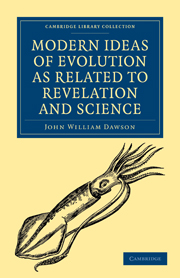Book contents
- Frontmatter
- PREFACE
- Contents
- CHAPTER I PRESENT ASPECTS OF THE QUESTION
- CHAPTER II WHAT IS EVOLUTION?
- CHAPTER III THE ORIGIN OF LIFE
- CHAPTER IV THE APPARITION OF SPECIES IN GEOLOGICAL TIME
- CHAPTER V MONISTIC EVOLUTION
- CHAPTER VI AGNOSTIC EVOLUTION
- CHAPTER VII THEISTIC EVOLUTION
- CHAPTER VIII GOD IN NATURE
- CHAPTER IX MAN IN NATURE
- CHAPTER X GENERAL CONCLUSIONS
- APPENDIX I WEISMANN ON HEREDITY
- APPENDIX II DR. McCOSH ON EVOLUTION
CHAPTER X - GENERAL CONCLUSIONS
Published online by Cambridge University Press: 29 August 2010
- Frontmatter
- PREFACE
- Contents
- CHAPTER I PRESENT ASPECTS OF THE QUESTION
- CHAPTER II WHAT IS EVOLUTION?
- CHAPTER III THE ORIGIN OF LIFE
- CHAPTER IV THE APPARITION OF SPECIES IN GEOLOGICAL TIME
- CHAPTER V MONISTIC EVOLUTION
- CHAPTER VI AGNOSTIC EVOLUTION
- CHAPTER VII THEISTIC EVOLUTION
- CHAPTER VIII GOD IN NATURE
- CHAPTER IX MAN IN NATURE
- CHAPTER X GENERAL CONCLUSIONS
- APPENDIX I WEISMANN ON HEREDITY
- APPENDIX II DR. McCOSH ON EVOLUTION
Summary
We have already seen that, agnostics themselves being judges, man must have a religion, and that if he makes the material universe the highest object of veneration this must be to him his God, while if he is content to take humanity as his highest ideal, he must look for the best possible manifestations of human nature, else his religion can have no elevating power. To the theist the universe is not in itself God, but may testify to God as its Creator; to the Christian the noblest ideal of humanity along with divinity is the Lord Jesus Christ.
It is evident, however, that the current Darwinian and Neo-Lamarckian forms of evolution fall entirely short of what even the agnostic may desiderate as religion.
If the universe is causeless and a product of fortuitous variation and selection, and if there is no design or final cause apparent in it, it becomes literally the enthronement of unreason, and can have no claims to the veneration or regard of an intelligent being. If man is merely an accidentally improved descendant of apes, his intuitions and decisions as to things unseen must be valueless and unfounded. Hence it is a lamentable fact that the greater part of evolutionist men of science openly discard all religious belief, and teach this unbelief to the multitude who cannot understand the processes by which it is arrived at, but who readily appreciate the immoral results to which it leads in the struggle for existence or the stretching after material advantages.
It is true that there may be a theistic form of evolution, but let it be observed that this is essentially distinct from Darwinism or Neo-Lamarckianism.
- Type
- Chapter
- Information
- Modern Ideas of Evolution as Related to Revelation and Science , pp. 226 - 234Publisher: Cambridge University PressPrint publication year: 2009First published in: 1890

